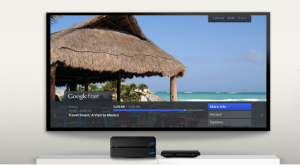
After more than 40 years of operation, DTVE is closing its doors and our website will no longer be updated daily. Thank you for all of your support.
Google Fiber won’t charge to prioritise Netflix
 Google has weighed into the recent internet traffic peering debate, claiming that it will not strike deals for its Google Fiber network to “prioritise” the performance of services like Netflix or YouTube.
Google has weighed into the recent internet traffic peering debate, claiming that it will not strike deals for its Google Fiber network to “prioritise” the performance of services like Netflix or YouTube.
In a post on the official Google Fiber blog, director of network engineering Jeffrey Burgan said that Google is open to peering and co-location deals for its nascent fibre internet network, but said it will not charge for doing so.
He said Google partners with the likes of YouTube, Netflix and Akamai to make a video’s journey “shorter and faster,” though stressed “this doesn’t involve any deals to prioritize their video ‘packets’ over others or otherwise discriminate among Internet traffic – we don’t do that.”
Burgan said that Google invites content providers to hook up their networks directly to Google Fiber’s network in peering deals that offer a more direct connection to content.
He also said that Google had worked with services like Netflix so they can co-locate their equipment in Google Fiber facilities. This server proximity means that content can travel faster and should be of a higher quality.
“We don’t make money from peering or colocation; since people usually only stream one video at a time, video traffic doesn’t bog down or change the way we manage our network in any meaningful way – so why not help enable it?”
“But we also don’t charge because it’s really a win-win-win situation. It’s good for content providers because they can deliver really high-quality streaming video to their customers,” said Burgan.
The comments come less than a month after Netflix signed an interconnect deal with US telecom operator Verizon in a bid to improve performance for customers. It reached a similar deal with Comcast in February, agreeing to pay the US cable giant to gain direct access to its network to deliver a better quality service to Comcast subscribers.
Yet in spite of this Netflix’s CEO Reed Hastings went on the record in March to speak out against such agreements, calling for internet service providers must provide “sufficient access to their network without charge,” claiming that failure to do so would create a poor consumer experience and harm smaller internet service companies.
Google has rolled out Gigabit-speed broadband – offering internet and fibre-powered TV services – in Kansas City, Austin and Provo, and is currently assessing 34 more US cities for the next stage of its rollout.


